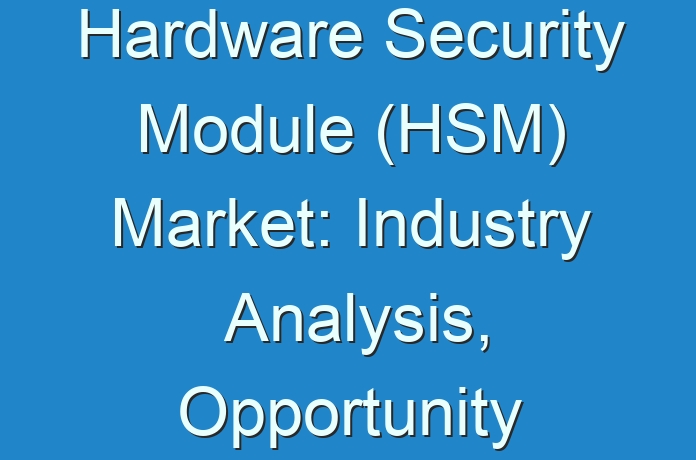
Hardware security module (HSM) is a piece of hardware and associated software/firmware attached to or placed inside a particular hardware to serve cryptographic functions. Its functions largely include key management/generation, encryption, decryption, and hashing. HSM systems have the ability to securely back up the keys that they can be handled using some external security token such as smart card or via operating systems of the computer. The market for hardware security module is forecasted to grow to US$ 6,592.5 Mn by 2027, recording a CAGR of 11.4%.
The major factor leading to the growth of the hardware security module (HSM) market is growing data security concerns in all the data sensitive companies around the world. Hardware security modules are responsible for efficiently storing and managing cryptographic keys. The HSM performs a number of important security related functions including encryption and message authentication. There are various attributes of an efficient HSM device including FIPS 140-1 or 140-2 validation, secure cryptographic algorithm, standardized interface for developers, key backup, and key protection among others. End-users of HSM largely evaluate the HSM device vendors on these features.
The comprehensive protection of data can lead to increasing demand for hardware security modules in the near future. Organizations in the Germany, U.S., and Japan are more likely to deploy HSMs for encryption/decryption and key management. HSM has become an important part of an organization’s encryption and key management program. Most organizations are also moving toward cloud based HSM since over a period this deployment model has become more feasible and cost effective largely among medium and small enterprises.
High cost of implementation and upgrade of hardware security modules is expected to be one of the major restraints pulling back the market growth, specifically that of the traditional hardware security module.
Get More Press Releases by TMR:https://www.biospace.com/article/featuring-performance-and-functionality-plastic-makes-strides-to-revolutionize-healthcare-packaging/
The global hardware security module market can be segmented based on application, type, and industry vertical. The type segment has further been segmented into remote interface, local interface, smart cards, and USB tokens. Remote interface HSM type held the major market share in 2019 in the overall hardware security module market. However, smart cards and USB tokens are expected to display comparatively fast growth during the forecast period. On the basis of application, the market has been divided as authentication, payment processing database encryption, document signing, code signing, PKI/credential management, Secure Socket Layer (SSL), and application level encryption.
From a geographical point of view, North America is expected to hold major share in the hardware security module market. Growth in this region is attributed to strong adoption and penetration of security modules as well as presence of large number of vendors across the region. However, Europe is also estimated to contribute significant share in the overall HSM market, closely followed by Asia Pacific. This growth is supported by APAC countries including Japan, China, and India. The global HSM revenue stood at US$ 2,775.4 Mn in 2019 and is anticipated to expand at a CAGR of 11.4% during the forecast period from 2019 to 2027. South America and Middle East & Africa are anticipated to grow at a relatively stable rate during the forecast period.
Based on industry vertical, the market is segmented into healthcare and life sciences, banking and financial institutions, government, technology and communication, energy and utility, industrial and manufacturing, retail and consumer, and others (automotive, hospitality and transportation). Among the industry verticals, the automotive and transportation segments are expected to expand at the fastest rate owing to the increasing deployment of HSM in automobile and transportation industry verticals. However, BFSI accounted for the largest share in 2019, followed by healthcare & life sciences.
Stuck in a neck-to-neck competition with other brands? Request a custom report on Hardware Security Module (HSM) Market
Attracted by a significantly expanding market, underlying technological advancements, and growing popularity of cloud-based HSM solutions, many players are driven to develop a comprehensive suite of modules for a number of industries. There is a rush of companies across industries to strengthen their foothold in the hardware security module market. In 2019, Atos SE entered into a strategic partnership with Orange Cyberdefense to focus on the market for secure mobile terminal communication. Key vendors in the market are continuously involved in improvement and development of more feasible HSM solutions. Some of the players profiled in the global hardware security module (HSM) market include





